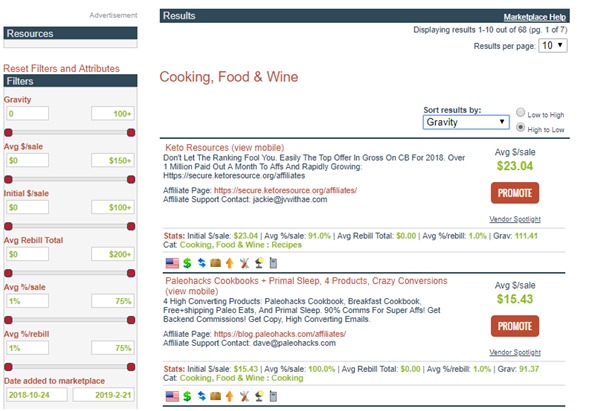In all my years as an SEO consultant, I can’t begin to count the number of times I saw clients who were struggling to make both SEO and affiliate marketing work for them.
When their site rankings dropped, they immediately started blaming it on the affiliate links. Yet what they really needed to do was review their search marketing efforts and make them align with their affiliate marketing efforts.
Both SEO and affiliate marketing have the same goal of driving relevant, high-quality traffic to a site so that those visits eventually turn into sales. So there’s absolutely no reason for them to compete against each other. Instead, they should work together in perfect balance so that the site generates more revenue. SEO done right can prove to be the biggest boon for your affiliate marketing efforts.
It’s crucial that you take a strategic approach to align these two efforts.
Four ways to balance your affiliate marketing and SEO efforts
1. Find a niche that’s profitable for you
One of the reasons why affiliate marketing may clash with SEO is because you’re trying to sell too many different things from different product categories. So it’s extremely challenging to align your SEO efforts with your affiliate marketing because it’s all over the place.
This means that you’ll have a harder time driving a targeted audience to your website. While your search rankings may be high for a certain product keyword, you may be struggling to attract visitors and customers for other products.
Instead of trying to promote everything and anything, pick one or two profitable niches to focus on. This is where it gets tricky. While you may naturally want to focus on niches in which you have a high level of interest and knowledge, they may not always be profitable. So I suggest you conduct some research about the profitability of potential niches.
To conduct research, you can check resources that list the most profitable affiliate programs. You can also use platforms like ClickBank to conduct this research. While you can use other affiliate platforms for your research, this is a great place to start. First, click on the “Affiliate Marketplace” button at the top of the ClickBank homepage.

You’ll see a page that gives you the option to search for products. On your left, you can see the various affiliate product categories available. Click on any of the categories that pique your interest.

On the search results page, you’ll see some of the affiliate marketing programs available on the platform. The page also displays various details about the program including the average earning per sale.
Then filter the search results by “Gravity,” which is a metric that measures how well a product sells in that niche.

You should ideally look for products with a Gravity score of 50 or higher. Compare the top Gravity scores of each category to see which is the most profitable. You can additionally compare the average earnings per sale for products in different categories.
2. Revise your keyword strategy
Since you’re already familiar with search marketing, I don’t need to tell you about the importance of keyword planning. That being said, I would recommend that you revise your existing keyword strategy after you’ve decided on a niche to focus on and the products you want to sell.
The same keyword selection rules apply even in this process. You would want to work with keywords that have a significant search volume yet aren’t too competitive. And you will need to focus on long-tail keywords for more accuracy. While you should still use the Google Keyword Planner, I suggest you try out other tools as well for fresh keyword ideas.
Among the free tools, Google Trends is an excellent option. It gives you a clear look at the changes in interest for your chosen search term. You can filter the result by category, time frame, and region. It also gives you a breakdown of how the interest changes according to the sub-region.

The best part about this tool is that if you scroll down, you can also see some of the related queries. This will give you insights into some of the other terms related to your original search term with rising popularity. So you can get some quick ideas for trending and relevant keywords to target.

AnswerThePublic is another great tool for discovering long-tail keyword ideas. This tool gives you insights into some of the popular search queries related to your search term. So you’ll be able to come up with ideas for keywords to target as well as topic ideas for fresh content.

3. Optimize your website content
High-quality content is the essence of a successful SEO strategy. It also serves the purpose of educating and converting visitors for affiliate websites. So it’s only natural that you will need to optimize the content on your website. You can either create fresh content or update your existing content, or you can do both.
Use your shortlisted keywords to come up with content ideas. These keywords have a high search volume, so you know that people are searching for content related to them. So when you create content optimized with those keywords, you’ll gain some visibility in their search results. And since you’re providing them with the content they need, you will be driving them to your site.
You can also update your existing content with new and relevant keywords. Perhaps to add more value, you can even include new information such as tips, stats, updates, and more. Whatever you decide to do, make sure the content is useful for your visitors. It shouldn’t be too promotional but instead, it needs to be informative.
4. Build links to boost site authority and attract high-quality traffic
You already know that building high-quality backlinks can improve the authority of your site and therefore, your search rankings. So try to align your link-building efforts with your affiliate marketing by earning backlinks from sites that are relevant to the products you’re promoting.
Of course, you can generate more social signals by trying to drive more content shares. But those efforts aren’t always enough. Especially if you want to drive more revenue.
I suggest you try out guest posting, as it can help you tap into the established audience of a relevant, authoritative site. This helps you drive high-quality traffic to your site. It also boosts your page and domain authority since you’re getting a link back from a high authority site.
Although Matt Cutts said in 2014 that guest posting for SEO is dead, that’s not true if you plan your approach. The problem is when you try to submit guest posts just for the sake of getting backlinks. Most reputable sites don’t allow that anymore.
To get guest posting right, you need to make sure that you’re creating content that has value. So it needs to be relevant to the audience of your target site, and it should be helpful to them somehow. Your guest posts should be of exceptional quality in terms of writing, readability, and information.
Not only does this improve your chances of getting accepted, but it also helps you gain authority in the niche. Plus, you will get to reach an engaged and relevant audience and later direct them to your site depending on how compelling your post is.
Bottom line
SEO and affiliate marketing can work in perfect alignment if you strategically balance your efforts. These tips should help you get started with aligning the two aspects of your business. You will need some practice and experimentation before you can perfectly balance them. You can further explore more options and evolve your strategy as you get better at the essentials.
Shane Barker is a Digital Strategist, Brand and Influencer Consultant. He can be found on Twitter @shane_barker.
The post How to perfectly balance affiliate marketing and SEO appeared first on Search Engine Watch.
from Search Engine Watch http://bit.ly/2Ij8qkT



No comments:
Post a Comment